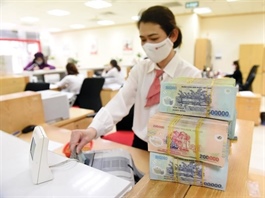Credit fuels private sector advances
Credit fuels private sector advances
Vietnam is leveraging supply chain financing as a game-changer to unlock capital and strengthen smaller businesses.

The meeting in Hanoi on March 24 (Photo: VNA) |
Deputy Prime Minister Nguyen Chi Dung chaired a meeting on developing private economic development on March 24, underscoring the government’s commitment to fostering this vital sector.
A few weeks previously, a steering committee was established in relation to the goal. The objective is to achieve an annual growth rate of 8 per cent upward, with aspirations for double-digit expansion.
Commenting on the proposal, the DPM acknowledged its solid foundation but urged a review of key perspectives, objectives, and specific targets to ensure alignment with reality. “We must primarily use fiscal, monetary, and administrative instruments to regulate, adjust, and facilitate to minimise direct state intervention through mandatory orders. Fairness among all economic sectors must be ensured while adhering to market economy principles and international commitments,” said DPM Dung.
An ongoing reality between borrowers and lenders is that banks, as financial intermediaries, must ensure lending security, often relying on collateral. Yet, many small- and medium-sized enterprises (SMEs) lack valuable assets to pledge.
Despite digitalised approval processes, banks cannot compromise on risk control, leading to immediate rejection for businesses failing disbursement conditions. A major hurdle remains financial transparency, with some SMEs maintaining dual accounting books, one for tax purposes and another for internal records, making risk assessment and loan approvals even more challenging.
Against this backdrop, Nguyen Kim Hung, chairman of multi-sector Kim Nam Group, expressed his hope that leading supply chain enterprises could function as banking agents for commercial banks.
“While this concept is not entirely new, it remains underutilised in Vietnam. Supply chain financing has immense growth potential, particularly if large anchor firms can guarantee loans for smaller businesses within the chain. This would provide banks with greater confidence and allow for more flexible risk assessment in lending,” said Hung.
“If banks lend to SMEs within a supply chain, with large enterprises assuming responsibility as the lead entity, then SMEs could share the credit limits of their larger counterparts. In such a scenario, collateral would no longer be necessary, as receivables could serve as a form of security,” he said.
The State Bank of Vietnam’s (SBV) Deputy Governor Dao Minh Tu stressed that the success of supply chain financing hinges on mutual commitment among all participants, even without legal obligations.
“The sector aims to implement collateral-free supply chain financing based on cash flow, benefiting businesses, banks, and the economy. However, its effectiveness depends on the commitment and responsibility of all parties, alongside the government’s coordinating role,” Tu said.
He cited the high-quality rice farming loan programme in the Mekong Delta, piloted for nearly two years, as a successful model benefiting all supply chain participants. Expanding such initiatives, he said, would greatly support businesses and the economy.
Tu warned of ongoing global economic complexities, including geopolitical conflicts, trade tensions, and high borrowing costs, which could heavily impact Vietnam’s open economy and private sector.
“To support private sector growth, the SBV will continue its proactive monetary policies, ensuring economic stability, controlled inflation, and reasonable lending rates. It will also enhance oversight of banking activities and refine credit policies,” Tu said.
From the banking sector, deputy general director of Agribank Phung Thi Binh stated that Agribank currently offers nine preferential credit programmes for various segments, including eight specifically designed for private economic households, covering exporters, SMEs, and business-consumer finance.
“These programmes feature interest rates 1-2 per cent lower than standard loans and provide incentives for exporters and businesses engaged in value chains. To bridge the gap between private economic households, particularly SMEs, and banks, Agribank has established partnerships with farmers and women’s associations.”
At last week’s banking conference on boosting the private sector, hosted by an SBV-affiliated agency, Nguyen Van Than, chairman of the Vietnam Association of Small- and Medium-sized Enterprises, stressed that while supply chain financing could enhance SME access to capital, businesses must also proactively adapt to this model, with financial transparency as a prerequisite.
“It is time for businesses to adopt transparent financial reporting with independent audits. This not only enhances credibility with banks but also facilitates integration into major supply chains,” Than said.
Also at the conference, Nguyen Thanh Khiet, chairman of ASCO Auditing, urged banks to design specialised financial products and assess creditworthiness based on transaction data rather than solely on collateral.
“The credit assessment process should be streamlined with automated approvals and risk models, reducing paperwork and accelerating access to capital. Fintech solutions leveraging AI and big data can further enhance accuracy,” Khiet said.
- 14:00 02/04/2025


























